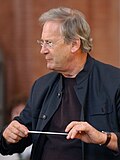Unser Mund sei voll Lachens, BWV 110
Unser Mund sei voll Lachens, BWV 110 is a cantata by Johann Sebastian Bach. The title means "May our mouth be filled with laughter and our tongue full of praise " in English.[1] Bach wrote the cantata in 1725. Georg Christian Lehms wrote the text. It was written for Christmas day.[2]
Music and structure
The cantata has seven movements.[2] The first movement is based on the overture of Bach's fourth Orchestral suite.[3] It is written for SATB chorus and soloists, three trumpets, a timpani, two oboes, two flutes, string ensemble, and basso continuo.[2]
- Chorus: Unser Mund sei voll Lachens
- Aria: Ihr Gedanken und ihr Sinnen
- Recitative: Dir, Herr, ist niemand gleich
- Aria: Ach Herr, was ist ein Menschenkind
- Duet: Ehre sei Gott in der Höhe
- Aria: Wacht auf, ihr Adern und ihr Glieder
- Choral: Alleluja! Gelobt sei Gott
Unser Mund Sei Voll Lachens, BWV 110 Media
John Eliot Gardiner, who conducted the Bach Cantata Pilgrimage, in 2007
References
- ↑ Browne, Francis. "Cantata BWV 110 - English Translation [Parallel Format]". www.bach-cantatas.com. Retrieved 24 December 2022.
- ↑ 2.0 2.1 2.2 Dürr, Alfred (2006). The Cantatas of J. S. Bach: With Their Librettos in German-English Parallel Text. Oxford University Press. p. 98. ISBN 978-0-19-929776-4.
- ↑ Kalisch, Volker (1996). "VON LACHENDER MUSIK, VOM LACHEN IN DER MUSIK". Neue Zeitschrift für Musik (1991-). 157 (1): 6–11. ISSN 0945-6945.
